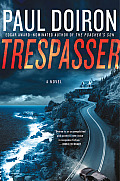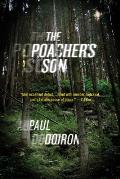
In my new book,
Trespasser, I observe that the most famous game warden in history is Robin Hood's arch foe, the Big Cheese of Nottingham. I think that says a lot about the relative obscurity of the profession of conservation law enforcement officer. It also frames the unique challenge of writing crime novels for a modern audience about a job that seemingly had its heyday during the time of Friar Tuck.
The profession of game warden has changed considerably since the reign of John Lackland. Medieval wardens were basically armored thugs whose job was to punish any knave or varlet caught poaching the king's deer. Protecting natural resources for future generations was not foremost in their minds (unless it was for future generations of Plantagenets).
Modern game wardens, by contrast, are dedicated professionals who risk their lives to stop elephant poachers, break up smuggling rings that trade in endangered birds and snakes (or even, more weirdly, in animal parts related to erectile dysfunction), and generally protect the well-being of people in remote and dangerous parts of the world. When I began researching my first novel, The Poacher's Son, I thought I knew about most of the brave and important work wardens did, but in truth, I had no clue. Nor do most people, I soon discovered.
 As my crime-solving protagonist, Warden Mike Bowditch, explains, "What I tried to explain to these nice people was that I was a cop and the forest was my beat." But even that description isn't completely accurate. In Maine, for example, game wardens have all the powers of state troopers. They are also charged with a slew of unusual duties that change from season to season. In the winter they enforce the state's snowmobile laws (13,000 miles of trail) and check ice fishing licenses. In mud season — which Mainers have instead of spring — they chase ATV vandals. Wardens enforce boating laws on Maine's 5,782 lakes and ponds as well as on all navigable rivers. In the summertime they stumble on backwoods marijuana plantations. And poaching — a year-round problem — gets worse as hunting season nears in the fall. Then there are the four-season emergencies: deer-car and moose-car collisions, tracking escaped convicts, rescuing injured mountain climbers, searching for people lost in the woods.
As my crime-solving protagonist, Warden Mike Bowditch, explains, "What I tried to explain to these nice people was that I was a cop and the forest was my beat." But even that description isn't completely accurate. In Maine, for example, game wardens have all the powers of state troopers. They are also charged with a slew of unusual duties that change from season to season. In the winter they enforce the state's snowmobile laws (13,000 miles of trail) and check ice fishing licenses. In mud season — which Mainers have instead of spring — they chase ATV vandals. Wardens enforce boating laws on Maine's 5,782 lakes and ponds as well as on all navigable rivers. In the summertime they stumble on backwoods marijuana plantations. And poaching — a year-round problem — gets worse as hunting season nears in the fall. Then there are the four-season emergencies: deer-car and moose-car collisions, tracking escaped convicts, rescuing injured mountain climbers, searching for people lost in the woods.
"Most days," Bowditch says, "I patrolled my district by truck, boat, or snowmobile, issuing warnings, handing out summons, and making arrests. Wherever I went in the woods, I traveled with the heart-heavy knowledge that I was alone and without backup, that the most apparently casual encounter could turn bad on me if I let down my guard, and that if I ran into trouble, I should probably not expect help any time soon."
Given this job description, I am surprised that so few crime authors have made game wardens their protagonists. Fiction is all about conflict, and game wardens live every day on the razor's edge between the past and the future, the city and the forest. A few years ago, Nature seemed to be losing topicality, but that was before a hurricane swallowed the Big Easy, an even bigger wave washed away part of Japan, and tornadoes cleared a mile-wide path through a Midwestern city.
Things are getting pretty wild out there, and, increasingly, game wardens are finding themselves at the center of the action. I don’t expect I’ll run out things to write about any time soon.